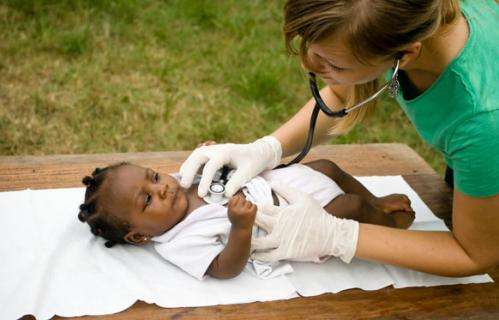Key to sustainable nutrition in Africa is prevention not treatment

(Medical Xpress)—Interventions to prevent, rather than treat nutritional problems, are needed to alleviate malnutrition and hunger in Sub-Saharan Africa according to new research.
Nutritional programmes by foreign donors in Africa typically focus on treatment and technical solutions, like vitamin and mineral supplementation. However ground breaking research conducted by the EU-funded Sustainable Nutrition Research for Africa in Years to come (SUNRAY) project discovered that community-based interventions to prevent, rather than treat nutritional problems are desperately needed.
The SUNRAY project is made up of a consortium of international academics from four leading European institutions including the University of Sheffield, universities in sub-Saharan Africa, non-governmental organisations and research funders.
Their findings, published in PLOS Medicine also show that African researchers and policy makers want the country to take charge of research priorities to beat malnutrition and hunger.
Michelle Holdsworth, Professor of Public Health at the School of Health and Related Research at the University of Sheffield said: "Africa faces huge problems of malnutrition in all its forms, including hunger, micronutrient deficiencies and obesity. This is the first study to consult with a large range of African stakeholders about what they see as the priorities for nutrition research in the context of increasing migration, ecological change and socio-demographic instability. The importance of prioritising research focussing on 'solutions' was seen as key."
While malnutrition rates globally are in decline, most African countries lag behind. Demographic and health surveys conducted in Benin, West Africa revealed the prevalence of stunting among children aged five and under increased from 25 per cent in 1990 to 45 per cent in 2011 – with nearly one out of three of these children suffering from a severe form.
Dr Eunice Nago Koukoubou, of the Université d'Abomey-Calavi in Benin, said: "Africa needs to take charge of research priorities if it is to beat hunger and malnutrition.
"African research is mostly descriptive and generates too little new evidence. Most of it is driven by a donor defined agenda and performed in collaboration with researchers from developed countries, while collaboration within Africa remains very poor."
African researchers also warn that the current nutrition research agenda is driven from outside Africa and call for additional efforts to promote cross-African networking of researchers, as well as interactions between researchers and policy makers.
Professor Patrick Kolsteren, of the Institute of Tropical Medicine (ITM) in Antwerp, coordinator of the SUNRAY project, said: "If donor countries and organisations, including the European Union, want to beat food insecurity and malnutrition, they need to change their approach. The research agenda should be based on needs identified within the continent. Calls for research proposals of donors should match this agenda."
SUNRAY project
The SUNRAY project has organised three regional workshops with African nutrition researchers and policy makers. They identified community-based interventions, behavioural strategies and food security interventions to improve nutrition status as priority areas for research.
In addition, the research identified four priority actions to foster African-driven nutrition research: improving governance of research; increasing capacity development, information and communication; and aligning research funding with African priorities.
To change the face of nutritional research in Africa, the SUNRAY project proposes an African-led systematic approach or "knowledge hub", which assesses and capitalizes on existing knowledge and effective solutions for major nutrition problems of Africa. This hub will also help to foster relationships between researchers and policy makers, and it would incorporate mechanisms to ensure optimal uptake and use of nutrition research findings for policy development, implementation and programming.
For more information visit www.sunrayafrica.co.za
More information: Lachat C, Nago E, Roberfroid D, Holdsworth M, Smit K, et al. (2014) Developing a Sustainable Nutrition Research Agenda in Sub-Saharan Africa—Findings from the SUNRAY Project. PLoS Med 11(1): e1001593. DOI: 10.1371/journal.pmed.1001593

















